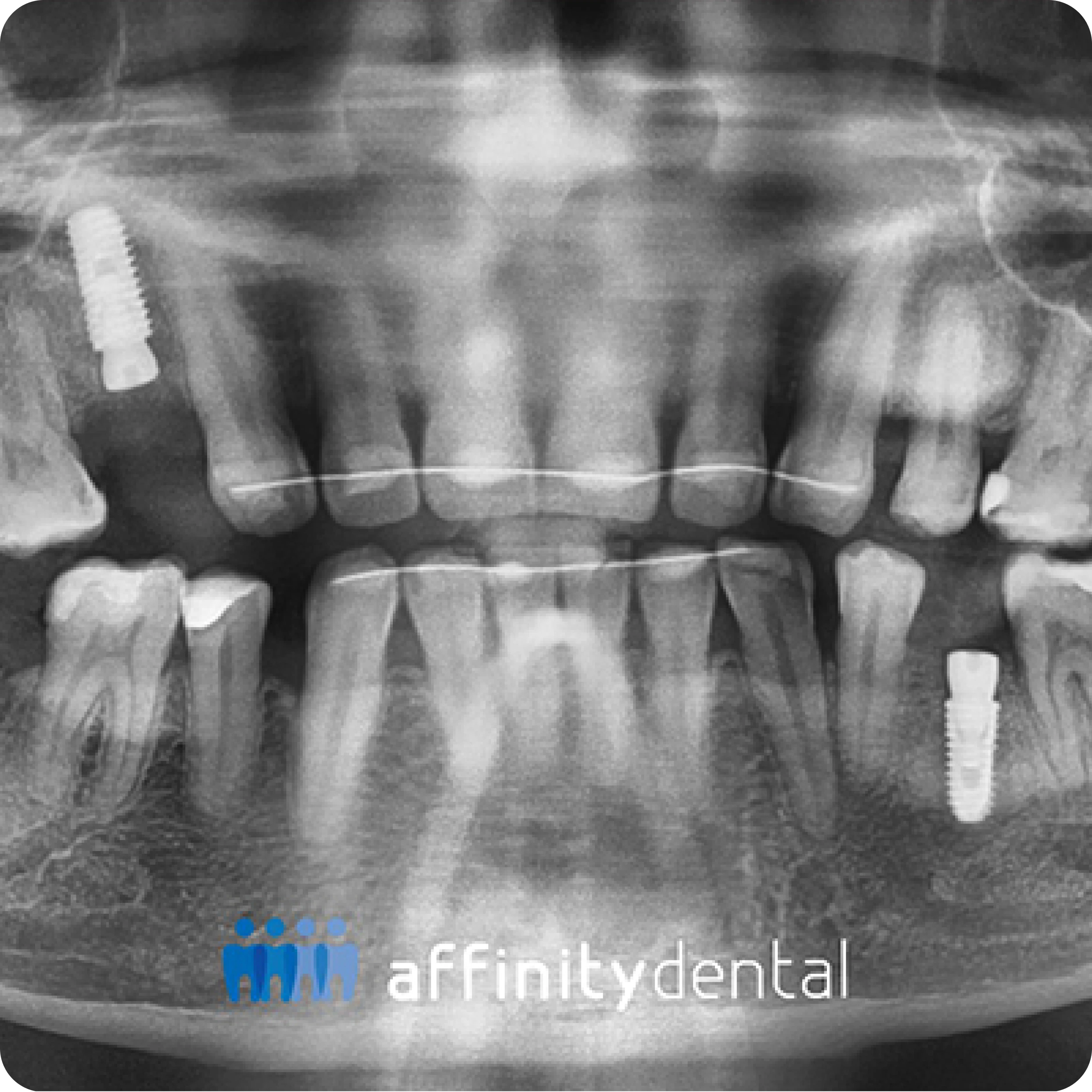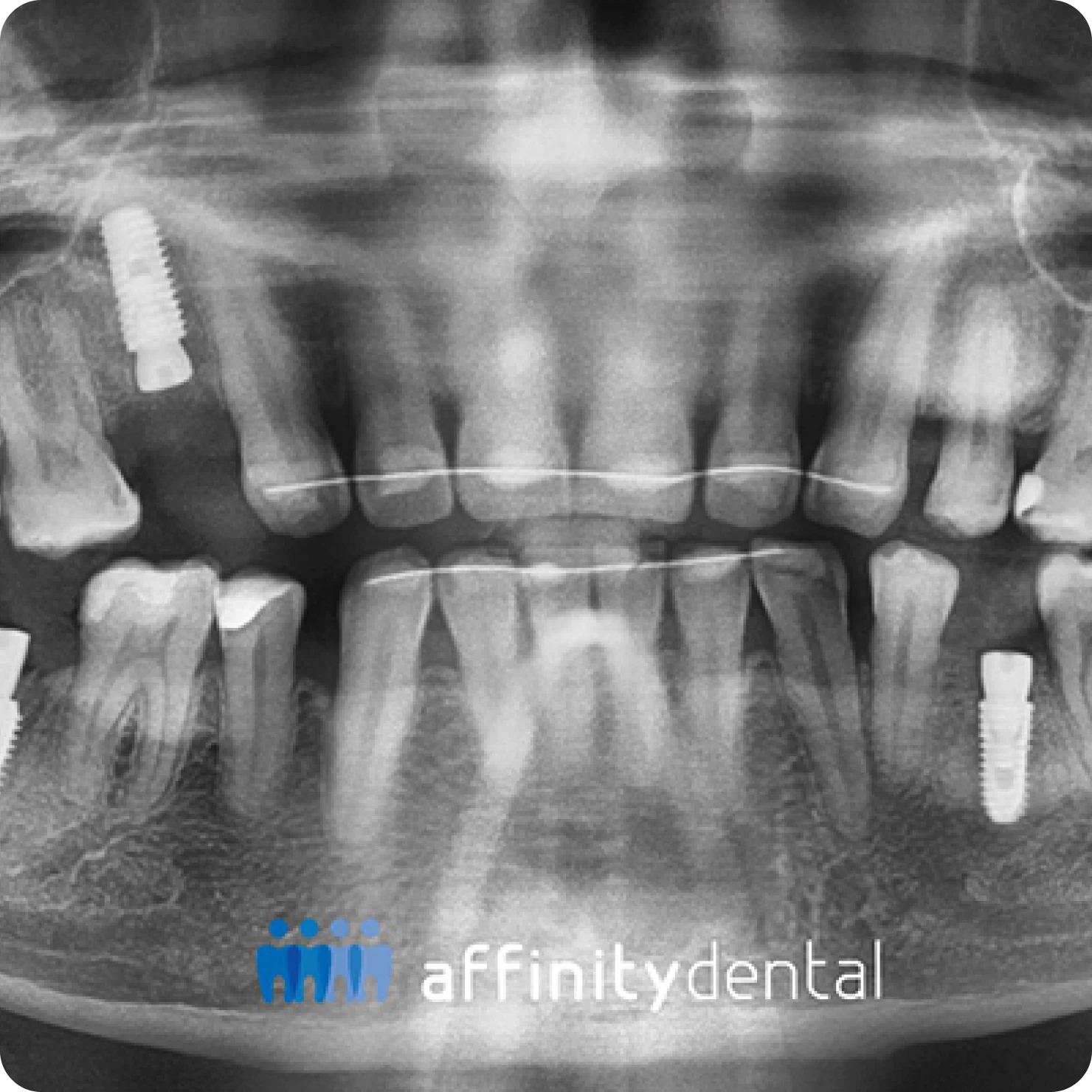Dental Implants
If you have missing teeth but do not want to wear removable dentures or a fixed dental bridge, then dental implants might be right for you.
A dental implant is an artificial tooth root that is inserted into the jaw to secure and hold the artificial tooth.


What are dental implants used for?
- Replace a tooth with a single implant and a crown.
- Replace several teeth with individual implants and crowns.
- Replace several teeth with an implant-supported bridge.
- Replace all your teeth with an implant-supported full bridge or denture.
Advantages
They are just like real teeth: Dental implants are designed to look, feel, and function like your natural teeth.
They preserve your bone: Dental implants preserve bone, prevent further bone loss, and help restore your jawbone structure.
They are permanent: Dental implants are permanently fixed and fused to your jawbone. Unlike dentures, you don’t need to take them off.
They last a very long time: Dental implants must be cared for just like real teeth. With good oral hygiene, proper care, and maintenance, implants can last you a lifetime.
They are very strong:Dental implants are made usually of titanium and zirconia. Both are very strong and durable biocompatible materials.
Very good success rate: Dental implants enjoy the highest success rate among titanium implants.
They do not damage other teeth: Unlike fixed dental bridges, dental implants do not need anchors or abutments. You don’t need to shave off healthy teeth to support an implant.
Procedure for Having Dental Implants
Read More About The Procedure
Having a dental implant requires your patience and your time. The biological basis of dental implant success is osseointegration. Osseointegration is the successful fusion of the titanium implant to your bone. It is not instant. Osseointegration is a natural process of your body that takes time.
Although the dental implant procedure will only take one day, the final implant crown can only be installed when the implant is secured and successfully integrated into your jawbone. This process may take up to 6 months depending on each patient’s condition.
1. Consultation
The first step to having dental implants is consultation. During the consultation, our implant specialist will personally examine your teeth, evaluate your case, advise you of your options, and provide you with a detailed treatment plan. Photographs, x-rays, and a dental impression of your teeth will also be taken during your consult. A CBCT Scan may also be required.
The implant specialist will also provide you with instructions on what to do before the surgery and on the day of your scheduled surgery.
2. Anesthesia
Depending on what you and the implant surgeon discussed during the consultation, you may either undergo surgery using local anesthesia only or conscious sedation:
Local anesthesia – The implant surgeon shall numb your gums with a topical substance before injecting local anesthesia at the site of the implant. You are fully awake and may feel some pressure or movement exerted by the implant specialist during the surgery but will not experience any pain.
Sedation anesthesia – An anesthesiologist will administer sedation anesthesia through an intravenous (IV) line in your arm. Sedation anesthesia or conscious sedation will fully relax you, suppress your consciousness, and even make you fall asleep during the procedure. You will not experience any pain during the procedure and will have very limited memory of the surgery after.
3. Surgery
Having a dental implant requires your patience and your time. The biological basis of dental implant success is osseointegration. Osseointegration is the successful fusion of the titanium implant to your bone. It is not instant. Osseointegration is a natural process of your body that takes time.
Although the dental implant procedure will only take one day, the final implant crown can only be installed when the implant is secured and successfully integrated into your jawbone. This process may take up to 6 months depending on each patient’s condition.
4.Recovery
After the surgery, you will be asked to stay to recover first if you underwent sedation. Before you are dismissed, the implant specialist will provide you with post-operative instructions. You might also be prescribed pain relievers and if needed, antibiotics.
You will be asked to visit after a few days to check the progress of your healing and/or to remove stitches.
5. Temporary Dentures
If needed, the implant specialist can fabricate a temporary partial denture for you to cover the gap where your tooth is missing.
6. Osseointegration
After the implant procedure, the process of osseointegration begins. As the jawbone heals, it will grow and fuse to the titanium implant. The healing process can take 6 to 24 weeks.
Your dentist will ask you to come back for occasional checkups during this period to check the healing of the implant.
7. Abutment
Once the implant has successfully integrated into the jawbone, your next appointment will be for the attachment of the implant abutment. After administering a local anesthetic, the implant surgeon will make an incision to reopen your gums to expose the dental implant.
Once the abutment is firmly attached to the implant, the surgeon will now stitch the gum tissue around the abutment. Once healed, the abutment will be used to secure and hold the new artificial tooth into place.
8. Fabrication
After the abutment is placed, the next step will be the fabrication of the artificial tooth. A dental impression will be taken of your mouth during the appointment. The cast will then be sent to the laboratory for the design and fabrication of the crown.
The type of crown to be fabricated will depend on what you and the implant specialist have agreed on. The crown will be installed two weeks after the placement of the abutment.
9. Crown
Your next and final appointment will be the installation of the final crown.
After the crown is cemented or screwed to the implant abutment, the implant process is finally completed. You are now ready to smile.
See Less
Are you a good candidate for Dental Implants?
The ideal candidate for dental implants should be free from periodontal disease, have good oral health, and should be physically healthy.
Healthy gums and sufficient bone volume and density in the jaw are necessary to be able to support the implant. If you have periodontal disease or bone loss in your jaws, you may still have dental implants after your conditions have been addressed with periodontal treatment or a bone graft procedure.
You might not be the best candidate for a dental implant if you:

Are you a heavy smoker

Have a compromised immune system

Have uncontrolled diabetes

Have heart disease

Have other uncontrolled chronic conditions

Had recent radiation therapy to the head/neck area
If you have any of these conditions, it might be safer for you to explore other tooth replacement options such as dentures and fixed dental bridges. If you still want to pursue dental implants, it will be best for you to first see your medical doctor for clearance before proceeding with a dental implant.
Frequently asked questions
Can all of my teeth be replaced by Dental Implants?
Can all of my teeth be replaced by Dental Implants?
You can replace a single tooth, multiple teeth, or all your teeth with implants. You don’t even need one implant for every missing tooth. As few as two implants can support or stabilize a removable denture and as few as four implants can provide a full set of top or bottom teeth that are permanent. Regardless of which option you choose, only you and your dentist will know that you have them.
Is it painful to have Dental Implants?
Is it painful to have Dental Implants?
Having dental implants is not as painful as you imagine. Patients say that having a tooth extraction feels worse.
Do not worry. A dental implant can be done with local anesthesia. If you are really scared or have anxiety, you can also have your dental implant under conscious sedation.
Any post-operative discomfort can usually be managed with over-the-counter anti-inflammatory medications such as ibuprofen.
Are Dental Implants expensive?
Are Dental Implants expensive?
At the outset, they are more expensive than other tooth replacement methods such as dentures or bridgework but they also last many years longer. Likely, they won’t ever need replacement. So they offer the best value by far when beauty is the long-term investment in your health well-being and comfort.
What should I avoid doing after getting Orthodontic Braces?
What should I avoid doing after getting Orthodontic Braces?
Just like you care for natural teeth with daily brushing and flossing and regular dental check-ups and cleanings. Although the implant teeth will never decay, the gum tissue around them can become inflamed or infected without good oral hygiene. Proper care for dental implants should last a lifetime.
How do I care for Dental Implants?
How do I care for Dental Implants?
Just like you care for natural teeth with daily brushing and flossing and regular dental check-ups and cleanings. Although the implant teeth will never decay, the gum tissue around them can become inflamed or infected without good oral hygiene. Proper care for dental implants should last a lifetime.